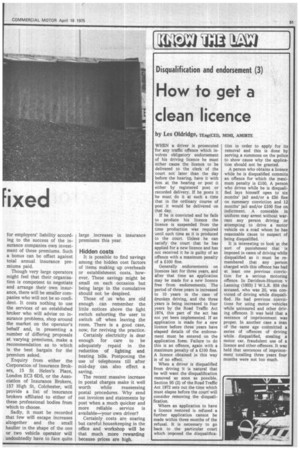Disqualification and endorsement (3)
Page 53

If you've noticed an error in this article please click here to report it so we can fix it.
How to get a clean licence
by Les Old ridge, TEng(CEI), MIMI, AMIRTE WHEN a driver is prosecuted for any traffic offence which involves obligatory endorsement of his driving licence he must either cause the licence to be delivered to the clerk of the court not later than the day before the hearing, have it with him at the hearing or post it either by registered post or recorded delivery. If he posts it he must do it at such a time that in the ordinary course of post it would be delivered on that day.
If he is convicted and he fails to produce his licence the licence is suspended from the time production was required until such time as it is produced to the court. Unless he can satisfy the court that he has applied for a new licence and has not received it he is guilty of an offence with a maximum penalty of a £100 fine.
Generally endorsements on licences last for three years, and after that time an application may be made for a new licence free from endorsements. The period of three years is increased to 10 years in the case of drunken driving, and the three years is being increased to four years by the Road Traffic Act 1974, this part of the act has not yet been implemented. If an application is made for a new licence before three years have elapsed details of the endorsement must be entered on the application form. Failure to do this is an offence, again with a maximum penalty of a £100 fine. A licence obtained in this way is of no effect.
When a driver is disqualified from driving it is natural that he will want the disqualification removed as soon as possible. Section 95 (2) of the Road Traffic Act 1972 sets out the time which must elapse before the court will consider removing the disqualification.
Where an application to have a licence restored is refused a further application cannot be made within three months of the refusal. It is necessary to go back to the particular court which imposed the disqualifica tion in order to apply for its removal and this is done by serving a summons on the police to show cause why the application should not be granted.
A person who obtains a licence while he is disqualified commits an offence for which the maximum penalty is £100. A person who drives while he is disqualified lays himself open to six months' jail and/or a £50 fine on summary conviction and 12 months' jail and/or £100 fine on indictment. A constable in uniform may arrest without warrant any person driving or attempting to drive a motor vehicle on a road whom he has reasonable cause to suspect of being disqualified.
It is interesting to look at the sort of punishment that is imposed in cases of driving while disqualified as it must be remembered that any person charged with this offence has had at least one previous conviction for a serious motoring offence. In Davidson-Houston v Lanning (1955) I W.L.R. 858 the accused, who was 20, was convicted of driving while disqualified. He had previous convictions for using motor vehicles while uninsured and other driving offences. It was held that a sentence of imprisonment was proper. In another case a man of the -same age committed a series of offences of driving while disqualified, stealing a motor car, fraudulent use of a licence and other offences. It was held that sentences of imprisonment totalling three years four months were not too much.








































































































































